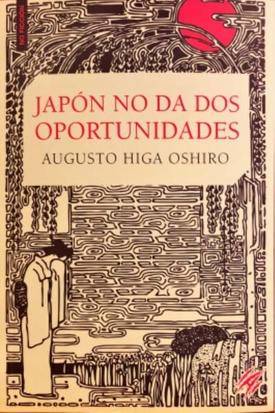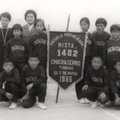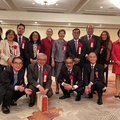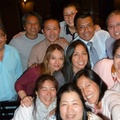In 1994, Augusto Higa published Japan does not give two opportunities , a book about his experience as a dekasegi at the beginning of the decade. It was the stark testimony of a Nisei who in the country of his parents crashes against his status as a gaijin, of a middle-aged man of letters who must deal with the exhausting physical work in Japanese factories and roads.
25 years later, the book is revived with a new edition that has had extensive press coverage, greater than that of the original version.
The work has not changed. The protagonist is the same. Everything he experienced in Japan remains intact. The author, however, has added new experiences to his life. The perspective broadens and perhaps the past reappears with nuances that enrich it.
A BIG INACCESSIBLE WORLD
Augusto Higa evokes Japan with nostalgia. “It was the discovery of a great world. A first world country,” he says.
A great world that he could not cross.
“There I discovered that I essentially had little Japanese. Very little. And the fact of not speaking (the Japanese language), of feeling discrimination, distanced me a little from Japan and turned me into an insular guy. “I, for example, have never seen a Japanese house.”
The writer did not manage to enter the home of a Japanese family. For Peruvians, the Japanese constituted a separate, inaccessible world. His contact with them was limited to work. In those days, at the dawn of the dekasegi phenomenon, that's how things were. Peruvians on one side, Japanese on the other, and a clear dividing line between the two.
Therefore, when one of the characters from Japan does not give him two chances , a Peruvian dekasegi, befriends a Japanese man at work and he invites him to his house, he becomes a source of admiration for the rest of the Peruvians. For a Japanese to open the doors of his family intimacy to you was almost equivalent to a social promotion.
“YOU NISEI ARE RACIST”
Like thousands of Peruvians, Augusto Higa migrated to Japan in search of economic stability that did not exist in the turbulent Peru of the late 1980s and early 2000s. He had a family to support.
The economic crisis in Peru was not the only thing that pushed him to leave. He also wanted to know the country of his ancestors, the perfect Japan stored in his imagination that he inherited from his parents.
“I wanted to know Japan, to what extent I could be recognized as Japanese, which I didn't achieve,” he says.
Despite his physiognomy, his Japanese surnames, the writer soon discovered his status as a foreigner. So much so that when a group of Peruvians walked down the street, the Japanese looked at them suspiciously, as if they were dangerous beings.
Now, discrimination did not make Peruvians a one-dimensional group, all cut from the same cloth. Augusto remembers that once a mestizo Nikkei, of Andean descent, told him: “You Nisei are racists.” By nisei he referred to those who had Japanese ancestors on both sides, those who in Peru formed the “colony”, the “whites” – that's what he called them – who discriminated against mestizos like him.
In Japan, of course, none of that mattered. “We were crew members of the same ship, without any difference. In Lima we could differentiate ourselves: 'I am more Japanese than you', 'you are less Japanese', 'you are more Peruvian', etc., but there (in Japan) everyone “We were equal,” says the writer.
WHEN YOU LEARN TO BE GAIJIN
Things hurt when they matter. Being discriminated against in Japan hurt. But human beings have a great capacity to adapt, to overcome adversity, to learn. And Peruvians in Japan learned to be foreigners, to throw discrimination on their backs, like a heavy burden that they suddenly let fall to move forward lightly. Why put up with it, as if it were a penance, if it is easier to get rid of it?
“We have learned to be foreigners. In the hairdresser we must make the gestures of the monkey, and those repellent gestures of the mute to establish that we want a haircut. The fear of ridicule is not important, suspicions no longer hurt us, being treated as inferior no longer hurts the soul, nor does it affect our susceptibility, nor does it move our pride. For them we are foreigners, and this learning about foreignness has been painful, some succumbed along the way, others could not stand the humiliations, however the majority survive through courage, wasting maturity, sweat, tears, and also overcoming storms. "We find deep joys that allow us to continue," writes Augusto Higa in Japan does not give two chances .
“THE JAPAN WAR”
Although the Japanese were impenetrable, the author admits that the Peruvians transferred their customs to Japan (“drinking in parks, outdoors, playing the cassette player at full volume, not respecting lines, cheating to throw two plates at each other at mealtime, talk like crazy”) without understanding that they were in another country and that they had to be respectful of it.
He remembers, for example, that in one of the factories in which he worked, a large one, with around a thousand employees, at lunchtime the Japanese delivered their food in ten minutes or less. The speed guaranteed the smooth operation of the dining room. A worker took his plate, sat down, ate quickly and stood up to give space to another. If I didn't act like that, everything would get stuck.
What did Peruvians do? Accustomed to the after-dinner meal, after eating lunch they did not get up to give their seat to someone else, but rather they began to talk and laugh, as they did in Peru, obstructing the Japanese machinery that did not rest even during lunch.
The writer explains that the title of his work is due to this mismatch: if due to your inadequate habits you lose the opportunity that Japan gives you by opening its doors to you, there is no longer a second one.
Now, while Japan offered you an opportunity, it didn't give you anything. The dekasegi experience was so hard that the book refers to it as “Japan's war,” not only because of the discrimination or the exhausting factory work, but also because of the distance from family, perhaps the most difficult of all.
When the Internet did not yet exist, the only possibility of having direct contact with the family in Peru, of hearing the voice of the loved one, were telephone calls.
Long queues of dekasegi formed at the telephone booths and one, involuntarily, became a witness to family dramas, men who argued loudly with their wives, who cried when listening to their children.
“The things you heard were terrible, fights with the wives ('hey, what happened to the money I sent you'). Others cried, others felt screwed. They were tremendous things. “He was brave,” he remembers.
However, people fought, warred and moved forward.
ONE HUNDRED PERCENT POSITIVE
Before becoming a dekasegi, Augusto Higa worked as a teacher, journalist and editor, intellectual tasks that did not prepare him for what Japan would have in store for him: work of strength and endurance, speed and manual dexterity.
If we add to that that he was over 40 years old, the shock was seismic. However, he survived. And today, almost three decades after his time in Japan, he rescues the positive.
“Despite the discrimination, despite the fact that we were in foreign territory, despite the totally different customs, I had the satisfaction of making ends meet and being paid well. That was enough for you to be there and send your family (in Peru). It is a great satisfaction; not to depend on anyone, not to be worried because this is not enough, because we are going to lack it for this or that thing.”
“The balance is positive, one hundred percent positive,” he says.
Another aspect that stands out was the experience of living in the first world, in a country where things work, where even the smallest towns enjoy all the services, from transportation to medical care, an abysmal difference with the Peru of then, it seemed about to collapse.
He also admired the discipline that was evident in the millimeter operation of the factories.
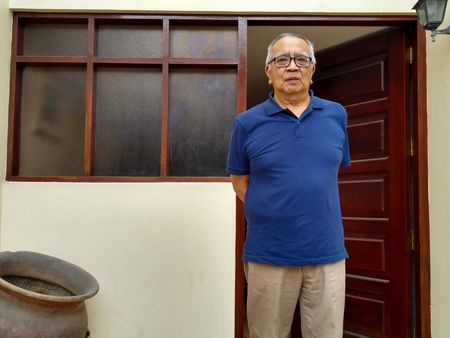
THANKS TO JAPAN
When he migrated to Japan, Augusto Higa was already a recognized writer. However, the Nikkei did not exist in his narrative. Everything changed with his dekasegi experience. Japan Doesn't Give You Two Chances was his first work with Nikkei characters. Since then, people of Japanese descent have been a central element of his stories, such as the protagonist of Katzuo Nakamatsu's celebrated novel The Enlightenment .
“It's a world that I had in the back room, in the unconscious, that I couldn't articulate,” he says, referring to the Nikkei. “Since I was 20, since I wanted to be a writer, I knew that I had to write a novel related to the Nikkei, but the years went by and I couldn't, I couldn't. Something was missing. I studied, studied and studied, and I couldn't," he adds.
Until he met Japan. That was what he was missing.
The Nikkei of his works is the Nisei born in the 1940s, during the war or in the early postwar years; a split person, who defined himself by denial.
“The world of the Nikkei that I have outlined is the world of the non-integrated, it is half Peruvian, half Japanese. It is a non-Peruvian, or a non-Japanese. It is there halfway, loose,” he explains.
Augusto Higa gave voice to the Nisei who were not recognized as Peruvian. He remembers that once, when he was a child, a salesman told him “you are Chinese,” denying his Peruvian identity. Those things hurt, without a doubt, and are not forgotten.
Even the praise made him feel like a foreigner. When Japan was already emerging as a technological power and its products were beginning to arouse worldwide admiration, Augusto remembers that they congratulated him on them, as if they had something to do with him.
All that is behind us. Not in vain have 50, 60 years passed. Peru is another. “Now my face, my last name, no longer cause surprise,” he says. “They no longer congratulate me on Japanese products, they already assume you are just another Peruvian; with its different characteristics, but you are one more.”
It is no longer a splinter Nisei. “Now I have fully integrated. “I am at peace with myself,” he says.
The situation has also improved within the Nikkei community. “When I go to the La Unión Stadium Association I meet completely integrated faces, with mestizos, and it makes me very happy that it has evolved like this.”
Naturally, none of this means forgetting where one comes from, what one's origins are. “My parents came from Okinawa, I still feel admiration and respect for Okinawa, and naturally for Japan, which is the great homeland.”
Despite the hardships and discrimination, a pioneering work was born from the great country whose reissue and good reception comfort Augusto Higa. “I am quite satisfied with the book, it has brought back emotions and memories from 25 years ago,” he says. Japan was worth it.
© 2020 Enrique Higa


